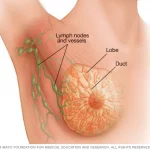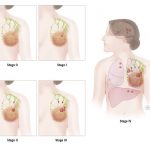
Cancer that begins in the breast when breast cells grow out of control is called breast cancer. The cancer cells form a tumor which is felt as a lump. It is common in women but men can also get breast cancer. When cancer cells are spread to other organs, it is called metastatic breast cancer.
The treatment includes surgical removal of the affected part, chemotherapy, radiation therapy, or immunotherapy.
How bad is my breast cancer?
The stages are based on the cancer growth or cancer spread.

Cancer has five stages, 0, 1, 2, 3, or 4. A lower number means the extent of cancer spread is minimum. A higher number means cancer has spread maximum.
The cancer cells are tested for progesterone and estrogen receptors. Hormone receptor-positive breast cancer occurs when proteins are present in cancer cells. The doctor identifies the levels of the HER2 protein in the cells. High levels are high HER2-positive cancer. These cancers are easier to treat. If both tests are negative for any of these proteins, it’s known as triple-negative breast cancer.
Keep track of your symptom using Ankr (myAnkr web portal or the Ankr app). It will help you describe the uneasiness to your doctor or nurse.
It is beneficial to test the cells for specific genes, which can help decide the effectiveness of chemo and the chances of recurrence.
Ask your doctor about these tests and what the results might mean. The treatment of your breast cancer depends on several factors outlined in medical tests.
Warning signs/severe symptoms that need immediate medical attention
- Nipple discharge, especially if it is bloody or comes from only one breast
- A change in the size or shape of the breast
- Skin irritation or dimpling on the breast
- Redness or flaky skin on the nipple or breast
- Pain in any area of the breast
- A sudden change in breast texture, such as a peau d’orange appearance (dimpled, pitted skin like the skin of an orange)
- Swelling or a lump in the armpit area
- A nipple that is turning inward or appears flattened
- A rash on or around the nipple
What tests are needed to diagnose breast cancer?
Doctors use several tests to diagnose breast cancer. One of these tests is a mammogram, which is like an X-ray that looks for lumps or abnormalities in the breast tissue. Another test is an ultrasound, which uses sound waves to create pictures of the breast tissue. A biopsy can also be advised by your Doctor to look under a microscope if cancer cells are present.
If breast cancer is found, more tests might be needed to see how far it has spread and decide on the best treatment. These tests may include an MRI, CT, or PET scan, and blood tests to check for certain proteins or genetic mutations.
It’s important to talk to your doctor about the results of these tests and ask any questions you might have to help make decisions about your treatment and care.
How to manage symptoms after breast cancer?
You may have a fear of cancer recurrence. Visit your doctor every three months or as recommended by your Doctor after the treatment ends. Do not skip follow-up visits. Your doctors will ask you about new symptoms. A physical examination and diagnostic tests may help to check recurrence.
How to prevent a breast cancer?
- Maintain a healthy weight
- Exercise regularly
- Limit alcohol consumption
- Don’t smoke
- Breastfeeding slightly lowers the risk of developing breast cancer.
- Get regular mammograms
- Know your family history
What caused my cancer?
- Gender (More common in women)
- Increased age
- Genetic make-up
- Previous breast cancer history
- Hormonal changes
- Hormone therapies
- Sedentary lifestyle
- Unhealthy diet
- excessive smoking and alcohol consumption
How can Ankr help with your breast cancer?
Don’t try to treat a breast cancer by yourself. Use Ankr to:
(1) learn about the common symptoms of breast cancer
(2) send message to your Doctor if they use Ankr platform*
(3) be better informed about how to prevent another breast cancer
